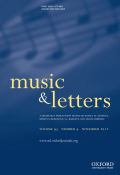
MUSIC & LETTERS
Scope & Guideline
Unveiling the Rich Tapestry of Musical Narratives
Introduction
Aims and Scopes
- Musicology and Historical Contexts:
The journal focuses on the study of music within its historical contexts, examining how music has interacted with cultural, social, and political factors throughout history. - Interdisciplinary Research:
It encourages interdisciplinary approaches that link musicology with areas such as philosophy, literature, history, and sociology, thereby broadening the scope of music studies. - Analysis of Musical Works:
A significant portion of the research involves detailed analysis of musical compositions, exploring aspects such as structure, style, and performance practices. - Cultural and Social Commentary:
The journal includes discussions on the cultural significance of music, addressing how music reflects and shapes societal values and norms. - Focus on Global Perspectives:
'Music & Letters' aims to incorporate global perspectives in music studies, highlighting diverse musical traditions and their socio-political implications.
Trending and Emerging
- Music and Politics:
An increasing number of articles explore the relationship between music and political movements, emphasizing how music serves as a form of activism and social commentary. - Cultural Memory and Identity:
There is a growing focus on the themes of cultural memory and identity, examining how music contributes to the construction and expression of identity in various contexts. - Intermediality in Music:
Emerging studies are examining the intermedial relationships between music and other art forms, such as literature, visual arts, and digital media, reflecting the contemporary blending of artistic practices. - Music and Technology:
The intersection of music and technology is increasingly prominent, with research addressing topics such as digital music production, sound engineering, and the impact of technology on musical practices. - Music and Ecologies:
A new trend is emerging around the ecological aspects of music, including the exploration of soundscapes, environmental impacts of music production, and music's role in ecological activism.
Declining or Waning
- Traditional Music Forms:
There appears to be a decreasing emphasis on traditional music forms and practices, as contemporary scholarship increasingly prioritizes modern and experimental music. - Biographical Studies of Composers:
Research centered solely on the biographies of individual composers has become less frequent, as scholars seek to contextualize music within broader cultural and theoretical frameworks. - Historical Performance Practice:
There is a noticeable decline in papers focusing exclusively on historical performance practices, suggesting a shift towards more integrative and theoretical approaches to performance.
Similar Journals
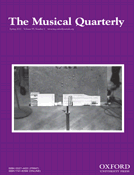
MUSICAL QUARTERLY
Connecting Scholars in the World of MusicMUSICAL QUARTERLY, published by Oxford University Press Inc, is a distinguished journal in the field of music, with a publication history that stretches back to 1915. This esteemed journal, identifiable by its ISSN 0027-4631 and E-ISSN 1741-8399, provides a critical platform for scholarly discourse, analysis, and research in musicology and related disciplines, facilitating an understanding of both historical and contemporary musical practices. Although it operates without open access, it continues to attract a diverse readership of researchers, educators, and students alike, thanks to its well-curated articles and reviews that engage with music theory, history, and ethnomusicology. With a current Scopus rank of #119 out of 180 in the Arts and Humanities category and a 34th percentile ranking in Music, MUSICAL QUARTERLY plays a vital role in advancing knowledge and fostering collaboration within the music academic community. Its commitment to high-quality scholarship is reflected in its ongoing efforts to address the evolving landscape of music studies, making it an essential resource for anyone serious about exploring the rich tapestry of music scholarship.
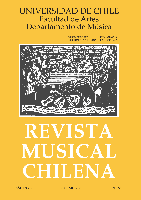
Revista Musical Chilena
Elevating Voices in Music Research and Cultural TheoryRevista Musical Chilena, an esteemed publication from the Faculty of Arts at Universidad de Chile, has been a pivotal platform in the field of music and cultural studies since its inception in 1945. With a commitment to open access, this journal promotes the dissemination of innovative research and critical discourse that bridges the gap between cultural theory and musical practice. Holding a notable Q2 ranking in both the Cultural Studies and Music categories as of 2023, it serves as a vital resource for scholars and professionals alike. The journal's inclusion in the Scopus database, with rankings that reflect its influence in the arts and humanities, underscores its significance in shaping the contemporary landscape of music studies. Given its convergence of research output from 2007 to 2024, Revista Musical Chilena continues to engage its audience with diverse scholarship that reflects Chilean musical heritage and global cultural dynamics.

ACTA MUSICOLOGICA
Cultivating Excellence in Musical ScholarshipACTA MUSICOLOGICA, published by the International Musicological Society, stands as a pivotal journal within the field of Musicology, garnering attention from scholars and practitioners alike. With its ISSN 0001-6241, the journal serves as a vital platform for innovative research and discourse from 2002 to 2013 and again from 2016 to 2024, achieving a Q2 ranking in the 2023 Music category. Reflecting a commitment to excellence, it ranks #105 out of 180 in Arts and Humanities Music according to Scopus, placing it at the 41st percentile among its peers. Although not open access, ACTA MUSICOLOGICA ensures the dissemination of significant musical research, fostering scholarly exchange and exploration. This esteemed publication is essential for researchers, professionals, and students looking to deepen their understanding of musicology and contribute to ongoing academic conversations.

Muzikoloski Zbornik
Fostering Global Discourse in Music ResearchMuzikoloski Zbornik is a prominent open-access journal in the field of musicology, published by the esteemed University of Ljubljana Press since 1965. Hailing from Slovenia, this journal has been dedicated to advancing the study of musical heritage, theory, and practice, serving as a vital platform for researchers, professionals, and students alike. With a notable Q2 category ranking in the field of music and a Scopus ranking of 109 out of 180 in Arts and Humanities, Muzikoloski Zbornik showcases high-quality research, fostering discourse and collaboration among scholars globally. The journal embraces a diverse range of topics, from ethnomusicology to music education, ensuring its relevance in an ever-evolving academic landscape. By providing unrestricted access to its content, it champions the dissemination of knowledge and supports the growth of the musicology discipline.
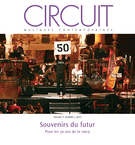
Circuit
Advancing Knowledge in Circuit EngineeringCircuit is a prominent academic journal published by PRESSES UNIV MONTREAL, specializing in the field of electrical engineering and circuit design. With its ISSN 1183-1693, the journal serves as a vital platform for disseminating cutting-edge research, innovative methodologies, and breakthrough technologies that shape the future of circuit theory and applications. Despite the absence of an official impact factor, the journal maintains a commitment to rigorous peer review and scholarly excellence, ensuring high-quality content for its readers. Although it operates under a traditional subscription model rather than Open Access, Circuit is essential for researchers, professionals, and students seeking to deepen their knowledge in circuit engineering and related disciplines. Its position within academic literature makes it an invaluable resource for advancing the understanding and development of electrical systems, highlighting the ongoing importance of this field in a technology-driven world.
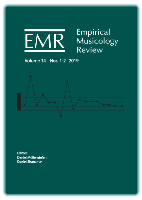
Empirical Musicology Review
Bridging Theory and Practice: Where Musicology Meets MethodologyEmpirical Musicology Review is a pioneering journal in the field of musicology, published by the Ohio State University School of Music. Established as an open access journal since 2006, it aims to foster interdisciplinary research by providing a platform for scholars to disseminate empirical studies and analyses related to music. With ISSN 1559-5749, this journal plays a crucial role in expanding the understanding of music through methodological rigor and innovative practices, catering to researchers, professionals, and students alike. By promoting the accessibility of high-quality research, Empirical Musicology Review significantly contributes to the evolving landscape of music studies and enhances the global dialogue surrounding music's theoretical and practical dimensions. The journal's commitment to open access ensures that its valuable insights reach a broad audience, encouraging further exploration and collaboration within the musicology community.

Studia Universitatis Babes-Bolyai Musica
Connecting Cultures Through Sound and StudyStudia Universitatis Babes-Bolyai Musica is a prestigious academic journal dedicated to the field of musicology, published by UNIV BABES-BOLYAI. Since its inception, it has strived to foster scholarly communication and share groundbreaking research that spans various music-related disciplines, including ethnomusicology, music theory, and performance studies. The journal operates under an Open Access model since 2021, ensuring that its content is freely accessible to a global audience of researchers, professionals, and students interested in advancing their knowledge and understanding of music. By providing a platform for high-quality, peer-reviewed articles, Studia Universitatis Babes-Bolyai Musica plays a vital role in promoting significant contributions to the evolving discourse in music studies. Its commitment to intellectual rigor and openness aligns with contemporary academic trends, making it an essential resource in the realm of music research.

Revista de Musicologia
Exploring the Depths of MusicologyRevista de Musicologia is a distinguished academic journal dedicated to the exploration and analysis of musicology, published by the SOC ESPANOLA MUSICOLOGIA. Based in Spain, this journal serves as a vital platform for music scholars, researchers, and enthusiasts to share innovative insights and original research concerning various aspects of music, including historical studies, ethnomusicology, and contemporary critiques. With its ISSN 0210-1459 and a current Scopus ranking placing it in the Q3 quartile of Music studies, the journal reflects a commitment to enhancing the discourse in this rich field. Although it currently does not publish under an open-access model, it continuously aims to provide a rigorous peer-reviewed environment for contributions that engage both academic inquiry and practical applications within musicology. The Revista de Musicologia is thus an essential resource for anyone in the field looking to expand their understanding and expertise in music studies from 2016 through 2024 and beyond.

Musica Oral del Sur
Exploring the Heartbeat of Southern Music TraditionsMusica Oral del Sur is a prominent academic journal published by the Junta Andalucía through the Centro Documentación Musical Andalucía. With its ISSN 1138-8579 and E-ISSN 2445-0391, this pioneering publication has championed open access since 1995, providing a vital platform for scholars dedicated to the exploration of traditional and contemporary oral music practices in Southern Spain and beyond. The journal is essential for researchers, professionals, and students interested in musicology, ethnomusicology, and cultural studies, promoting scholarly discourse through a rich assortment of articles, reviews, and field research. Set in the vibrant cultural landscape of Granada, the journal encourages the fusion of theoretical insights with practical implications, making significant contributions to the understanding of oral musical traditions. By fostering accessible academic dialogue, Musica Oral del Sur plays an invaluable role in preserving and highlighting the heritage of Southern musical expressions while addressing contemporary issues in the field.
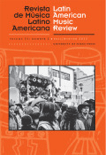
LATIN AMERICAN MUSIC REVIEW-REVISTA DE MUSICA LATINOAMERICANA
Exploring the Rhythms of Latin America's Rich Musical HeritageLATIN AMERICAN MUSIC REVIEW-REVISTA DE MUSICA LATINOAMERICANA stands as a prominent scholarly journal dedicated to the profound and diverse traditions of Latin American music. Published by University of Texas Press, this journal offers a platform for critical analysis, innovative research, and the dissemination of knowledge concerning the rich cultural heritage of Latin America. Although it currently does not provide open access options, the journal has made significant contributions to the field since its establishment, engaging a wide array of interdisciplinary perspectives. With coverage spanning from 2002 to 2009, the journal has been central to fostering scholarly dialogue and expanding the academic understanding of Latin American musicology, serving as an essential resource for researchers, professionals, and students alike. The journal is vital for those exploring the intersections of music, culture, and identity within the vibrant landscapes of Latin America.